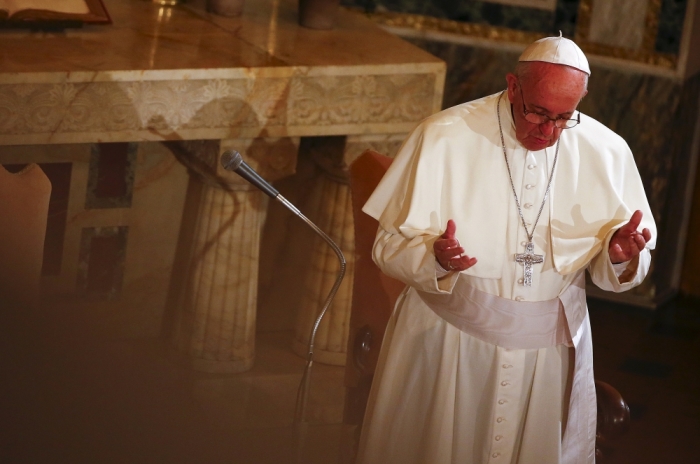Pope Remains Silent on Religious Freedom in His First Interview on China

In his first interview on China, Pope Francis urged the world not to fear the communist country's fast rise and sent Chinese New Year's greetings to the Chinese people and President Xi Jinping, but didn't raise the issue of religious restrictions.
"For me, China has always been a reference point of greatness. A great country. But more than a country, a great culture, with an inexhaustible wisdom," the pope told Hong Kong-based Asia Times in the interview.
The Vatican does not have formal relations with China, but has had three rounds of negotiations with Beijing since 2014, and as a result China recently recognized two bishops approved by the Vatican.
When China's communists came to power in 1949, they expelled Christian missionaries while allowing churches to function under the government's control. Chinese Christians faced severe persecution during the Cultural Revolution of the 1960s and the 1970s under Mao, who saw religion as "poison." In 1957, the Chinese government established the Chinese Patriotic Catholic Association, which is not under the authority of the Holy See and appoints its own bishops.
Churches are now allowed to function but only as long as they register with the government and thereby come under its control. Some of the Catholic bishops appointed in China have the approval of the Vatican, which has excommunicated at least two bishops consecrated by the Chinese church.
Hundreds of thousands of unofficial house churches, largely indigenous, exist all across the country. Evangelism is allowed, but only in state-approved religious venues and private settings.
"The true balance of peace is realized through dialogue. Dialogue does not mean that we end up with a compromise, half the cake for you and the other half for me," the pontiff said in the interview. "No, dialogue means: look, we have got to this point, I may or may not agree, but let us walk together; this is what it means to build. And the cake stays whole, walking together. The cake belongs to everyone, it is humanity, culture."
Beijing wants the Vatican not to interfere in religious matters in China, accept the One-China policy and severs ties with the Taipei government.
On China's opening up to the world, Pope Francis said, "We must not fear challenges of any kind, since everyone, male and female, has within them the capacity to find ways of co-existing, of respect and mutual admiration. And it is obvious that so much culture and so much wisdom, and in addition, so much technical knowledge – we have only to think of age-old medicinal techniques – cannot remain enclosed within a country; they tend to expand, to spread, to communicate. Man tends to communicate, a civilization tends to communicate."
The pope concluded the interview by wishing the Chinese people and President Xi a happy new year. "On the eve of the New Year, I wish to convey my best wishes and greetings to President Xi Jinping and to all the Chinese people. And I wish to express my hope that they never lose their historical awareness of being a great people, with a great history of wisdom, and that they have much to offer to the world. The world looks to this great wisdom of yours. In this New Year, with this awareness, may you continue to go forward in order to help and cooperate with everyone in caring for our common home and our common peoples."
There are about 12 million Catholics in China.





























